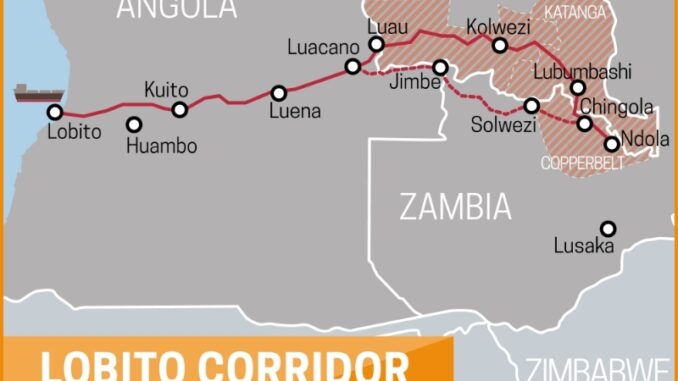
President of Zambia, Hakainde Hichilema, Senior Advisor to President Biden, Amos Hochstein, and President and CEO of the Africa Finance Corporation (AFC), Samaila Zubairu, convened the Partnership for Global Infrastructure and Investment (PGI) Lobito Corridor Private Sector Investor Forum in Lusaka last week.
This was the first PGI Investor Forum outside the United States, bringing together over 250 business and government leaders from Angola, the Democratic Republic of Congo (DRC), the European Union, the United States, and Zambia, as well as international investors and industry leaders.
The Forum was met to accelerate private sector investment in the Lobito Corridor, which will connect the DRC and Zambia with global markets through Angola.
The Lobito Corridor is the first strategic PGI economic corridor launched by President Biden at the G7 Summit in Japan in May 2023 under the flagship G7 Partnership for Global Infrastructure and Investment initiative. The corridor will integrate the African continent and enhance connections with global markets by expanding export possibilities, boosting regional trade, and growing key market segments, all while creating decent jobs and improving lives.
PGI’s efforts to upgrade and build new railway will result in the first trans-African rail line, stretching from the Atlantic Ocean to the Indian Ocean. A U.S. International Development Finance Corporation (DFC) $250 million investment, currently in due diligence, would support the Lobito Atlantic Railway (LAR) consortium that is upgrading and operating the 1,300 km Benguela rail line across Angola with advisory support from the Africa Finance Corporation (AFC). The LAR upgrade will dramatically reduce transport time, better connect critical mineral-rich regions in the DRC with global markets and lower the carbon emissions footprint of goods currently moved by road. By lowering costs for businesses along the corridor, it will also open new markets, including agribusiness.
The Investor Forum follows the signing of a Memorandum of Understanding (MOU) in October 2023 in which the African Development Bank, the AFC, the governments of Angola, DRC, Zambia and the United States, and the European Commission underscored their shared commitment to developing the Lobito Corridor. The MOU named AFC as lead developer on the new Zambia-Lobito rail line extending from the Benguela line into northwest Zambia. In addition to rail, PGI is investing catalytic public funds alongside G7 and African partners in various sectors, demonstrating a new model of holistic private-sector led infrastructure development while maintaining strong labor and environmental standards, and promoting trade and investment on the African continent.
The PGI Forum marks the partners coming together to further mobilize private sector investment across the Lobito Corridor and unlock the enormous potential of this region. During the forum in Lusaka, the U.S. Government and partners announced additional commitments to the corridor.
In this vein, DFC announced that its Board of Directors approved a new $250 million debt facility to the AFC that would support their efforts to develop high-quality and high-standards infrastructure across the continent. That potential project is now pending congressional review. DFC also marked its commitment to provide a $10 million loan to Seba Foods Zambia, the first U.S. food and agriculture investment along the Lobito Corridor.
Additionally, the United States Trade and Development Agency (USTDA) announced a feasibility study grant to REV-UP Solar Ventures Zambia to develop an estimated 200-megawatt solar power plant and battery energy storage system in Solwezi, Zambia. The project will supply clean, stable electricity to Zambian industry and households and has the potential to provide power for two critical mineral mines in the Democratic Republic of the Congo.
Last week, LAR announced a six-year export shipment term-sheet with Canadian mining company Ivanhoe that will advance the rail line’s ambitions to become the leading rail transport link in sub-Saharan Africa and support clean energy supply chain diversification.
Supporting efforts to unlock the potential of the Copperbelt region, AFC has entered into an MOU with Congolese commodity trading and mining company La Générale des Carrières et des Mines (Gécamines) to undertake the development of critical minerals in the DRC.
AFC has also signed an expression of interest with Kobaloni Energy to provide $100 million in financing for a cobalt refinery in Chingola, Zambia, with the objective of building the first electric vehicle battery grade cobalt sulphate plant on the African continent.
These announcements build on the more than $1 billion of U.S. government investments made in Angola in the past year. This includes an Export-Import Bank of the United States (EXIM) authorization of a more than $900 million loan supporting construction of two solar energy power plants that will generate over 500 megawatts of renewable energy, and an additional $363 million EXIM loan guarantee to support financing and construction of over 180 bridges connecting rural Angolan communities. Further, two USAID grants are enabling Africell’s recent mobile money launch to reach more underserved populations, and to expand an existing program supporting women farmers to communities around the Lobito Atlantic rail line.
This milestone underlines the importance of the Lobito Corridor initiative. The corridor is a vital logistics hub that connects the region to international markets while demonstrating that strategic public infrastructure investment can mobilize private investment across multiple sectors to promote economic growth that transforms the region.
